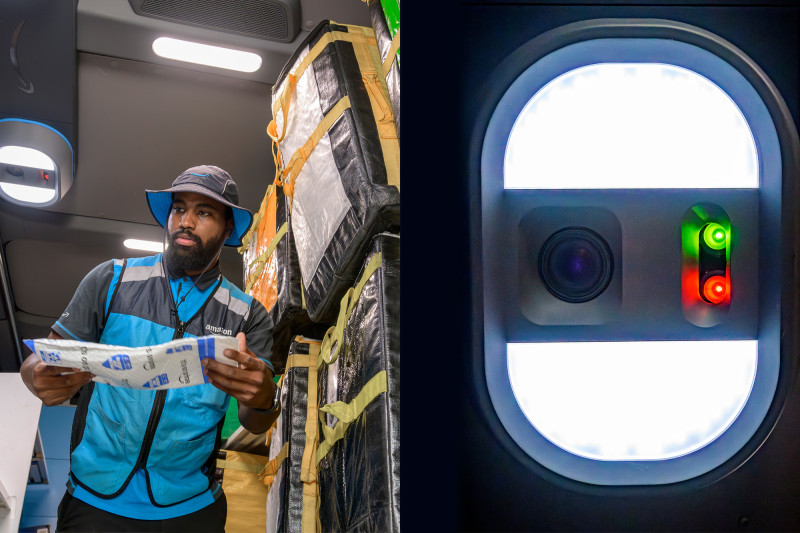Amazon’s new AI system projects green and red markers onto packages to streamline deliveries
Amazon unveiled new AI technology called Vision-Assisted Package Retrieval (VAPR) for the cargo hold of its electric Rivian vans, giving drivers audio and visual cues about which packages should be delivered at a given stop.
The system, announced Wednesday morning, integrates with the vehicle’s navigation system to project a green “O” on packages to be delivered at a given stop, and a red “X” on all others in the back of a delivery van. This reduces the need to manually sort and organize packages between stops, according to the company.
Amazon says VAPR, in the works since 2020, will be rolled out to 1,000 vans initially early next year. It’s an outgrowth of an Amazon Robotics Identification (AR-ID) system originally used in the company’s fulfillment centers.
It’s part of a larger effort by Amazon to use AI and machine learning to improve the efficiency of the 390,000 delivery drivers who work for independent Delivery Service Partners, delivering packages in Prime-branded uniforms and vehicles.

In some situations, Amazon’s automated routing algorithms have left those drivers scrambling to keep up. In this case, Amazon points to indications that the technology will make the job easier.
Amazon says its early tests resulted in “a 67% reduction in perceived physical and mental effort for drivers and more than 30 minutes saved per route.”
Its announcement quotes a driver in the North Boston area saying that VAPR has reduced the time emptying totes and organizing packages between stops to about a minute, vs. 2 to 5 minutes previously.
This was one of several announcements at Amazon’s annual “Delivering the Future” robotics, transportation, and logistics event in Nashville on Wednesday morning.
Other news included:
- The announcement of Amazon’s next-generation fulfillment center, with updated and expanded versions of its robotics systems in Shreveport, La.
- New “AI Shopping Guides” in the Amazon shopping app that use generative AI to provide key information about more than 100 product types, for researching and comparing products.
- Investments by Amazon’s Climate Pledge Fund in three startups: Molg, which makes robots that assemble and disassemble complex electronics for reuse; Paebbl, which turns CO2 into carbon-storing building materials; and 14Trees, which uses 3D printing technology to create lower-carbon buildings.
- Progress reducing plastic in Amazon packaging, including the removal of all plastic air pillows from Amazon delivery packaging in its fulfillment centers as of this month; and the retrofitting of 120 automated packaging machines to produce custom paper bags, rather than plastic bags.

